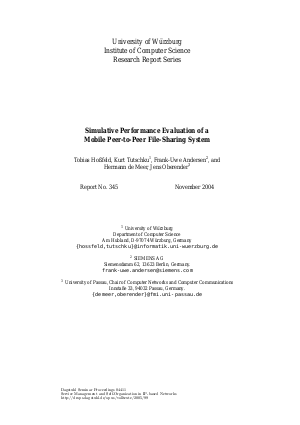Simulative Performance Evaluation of a Mobile Peer-to-Peer File-Sharing System
Authors Kurt Tutschku, Tobias Hoßfeld, Hermann de Meer, Jens Oberender, Frank-Uwe Andersen
-
Part of:
Volume:
Dagstuhl Seminar Proceedings, Volume 4411
Part of: Series: Dagstuhl Seminar Proceedings (DagSemProc) - License:
 Creative Commons Attribution 4.0 International license
Creative Commons Attribution 4.0 International license
- Publication Date: 2005-03-24
File

PDF
DagSemProc.04411.20.pdf
- Filesize: 349 kB
- 17 pages
Document Identifiers
Subject Classification
Keywords
- peer-to-peer
- UMTS
- performance evaluation
- file-sharing
Metrics
- Access Statistics
-
Total Accesses (updated on a weekly basis)
0Document
0Metadata
Abstract
Peer-to-Peer (P2P) file-sharing has become the killer application in the wired Internet and might also be highly attractive for mobile networks. In particular since UMTS operators are searching for new applications which do both: a) exploit the potential of the UMTS technology and b) motivate the user to adopt the new technology. In this work we are investigating the performance of an eDonkey-based mobile P2P file-sharing system by means of time-dynamic simulation. Mobile networks differ from wireline networks by the limited capacity of the radio link and the mobility of the users. P2P networks, in contrast, are overlays which consider the transport network in an abstract way. In a mobile environment, the question arises, whether the abstraction can be maintained and what will be the performance impact if there is any. We will show in detail how the mobile access technology (GPRS or UMTS), the churn behavior of mobile users, the file size of mobile specific content, and special infrastructure entities, such as a cache peer, influences the performance of the suggested mobile P2P file-sharing service.
Cite As Get BibTex
Kurt Tutschku, Tobias Hoßfeld, Hermann de Meer, Jens Oberender, and Frank-Uwe Andersen. Simulative Performance Evaluation of a Mobile Peer-to-Peer File-Sharing System. In Service Management and Self-Organization in IP-based Networks. Dagstuhl Seminar Proceedings, Volume 4411, Schloss Dagstuhl – Leibniz-Zentrum für Informatik (2005)
https://doi.org/10.4230/DagSemProc.04411.20
BibTex
@InProceedings{tutschku_et_al:DagSemProc.04411.20,
author = {Tutschku, Kurt and Ho{\ss}feld, Tobias and Meer, Hermann de and Oberender, Jens and Andersen, Frank-Uwe},
title = {{Simulative Performance Evaluation of a Mobile Peer-to-Peer File-Sharing System}},
booktitle = {Service Management and Self-Organization in IP-based Networks},
series = {Dagstuhl Seminar Proceedings (DagSemProc)},
ISSN = {1862-4405},
year = {2005},
volume = {4411},
editor = {Matthias Bossardt and Georg Carle and D. Hutchison and Hermann de Meer and Bernhard Plattner},
publisher = {Schloss Dagstuhl -- Leibniz-Zentrum f{\"u}r Informatik},
address = {Dagstuhl, Germany},
URL = {https://drops.dagstuhl.de/entities/document/10.4230/DagSemProc.04411.20},
URN = {urn:nbn:de:0030-drops-999},
doi = {10.4230/DagSemProc.04411.20},
annote = {Keywords: peer-to-peer , UMTS , performance evaluation , file-sharing}
}
